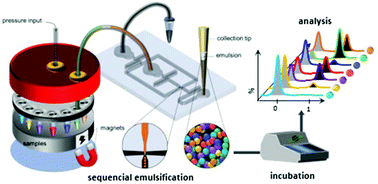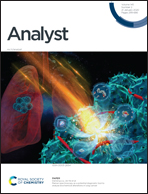Streamlined digital bioassays with a 3D printed sample changer†
Abstract
Droplet-based microfluidics has permeated many areas of life sciences including biochemistry, biology and medicine. Water-in-oil droplets act as independent femto- to nano-liter reservoirs, enabling the parallelization of (bio)chemical reactions with a minimum sample input. Among the range of applications spanned by droplet microfluidics, digital detection of biomolecules, using Poissonian isolation of single molecules in compartments, has gained considerable attention due to the high accuracy, sensitivity and robustness of these methods. However, while the droplet throughput can be very high, the sample throughput of these methods is poor in comparison to well plate-based assays. This limitation comes from the necessity to convert independently each sample into a monodisperse emulsion. In this paper, we report a versatile device that performs the quick sequential partitioning of up to 15 samples using a single microfluidic chip. A 3D printed sample rotor is loaded with all samples and connected to a pressure source. Simple magnetic actuation is then used to inject the samples in the microfluidic chip without pressure disruption. This procedure generates monodisperse droplets with high sample-to-sample consistency. We also describe a fluorescent barcoding strategy that allows all samples to be collected, incubated, imaged and analyzed simultaneously, thus decreasing significantly the time of the assay. As an example of application, we perform a droplet digital PCR assay for the quantification of a DNA amplicon from 8 samples in less than 2 hours. We further validate our approach demonstrating the parallel quantification of 11 microRNAs from a human sample using an isothermal nucleic acid amplification chemistry. As an off-chip device, the sample changer can be connected to a variety of microfluidic geometries and therefore, used for a wide range of applications.



 Please wait while we load your content...
Please wait while we load your content...